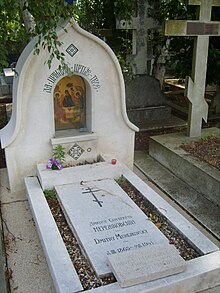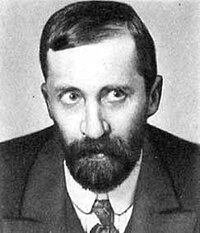Dmitri Sergejewitsch Mereschkowski

Dmitry Merezhkovsky ( Russian : Дмитрий Сергеевич Мережковский ., Scientific transliteration : Dmitry Sergeevič Merežkovskij ; born August 2 . Jul / 14. August 1865 greg. In St. Petersburg ; † 9. December 1941 in Paris ) was a Russian writer.
Life
Mereschkowski, whose father was a court official from the Ukrainian nobility, studied history from 1884 to 1889 in his native Saint Petersburg. He is a brother of the biologist Konstantin Sergejewitsch Mereschkowski . His first volume of poetry appeared in 1888, and in 1889 he married the poet Sinaida Nikolaewna Hippius (Gippius) . The couple had run a theological literary salon in St. Petersburg since 1901 and in Paris since 1920 when they emigrated (“ Green Lamp ”) . They are considered to be the spiritual pioneers of Russian symbolism . Her salon was considered an influential center for Christian-religious ethnic intellectuals.
Mereschkowski became known through a number of historical novels and short stories . His novel Leonardo da Vinci (1901, middle part of the trilogy Christ and Antichrist ), which was translated many times immediately after the appearance of the Russian edition, achieved enormously high editions worldwide - also in Germany - and was in the program of renowned paperback publishers such as Knaur in various translations or Piper . Mereschkowski is mentioned in the diaries of Georg Heym , who valued Leonardo da Vinci . The first part of Christ and Antichrist , published in 1896, entitled Julian Apostata, was at times very well known in Germany and was edited in a translation by Alexander Eliasberg from the German Book Association . The third volume of the trilogy, Peter and Alexej , appeared in 1905.
In November 1919 the Mereschkowski couple emigrated to Warsaw in the course of the October Revolution and traveled on to Paris in October 1920. In Paris, together with his wife Sinaida Hippius, he promoted the young writers of Russki Montparnasse who only began writing when they were emigrating, including Gaito Gasdanow and Boris Poplawski .
Mereschkowski was nominated for the Nobel Prize for Literature , but his sympathy for Italian fascism, which he expressed in his later political texts, should not have been conducive to an award. He was received by Mussolini twice, in 1934 and 1936 . The assessment of his relationship with Mussolini is controversial among literary historians. In Hanns Martin's Elster's foreword to Julian Apostata (Düsseldorf 1951), it is said that for a time he had hoped for Mussolini as a state theorist " without being able to trust fascism ". According to Elster, Mereschkowski stayed away from the Germans.
In the Russian emigration he isolated himself because in a speech he compared Hitler to Joan of Arc . He declared that Hitler threatened to destroy Russia as a country, but that this was less bad than the rule of Stalin , who was destroying the "Russian soul".
Mereschkowski's work has only been published and performed again in Russia since 1987.
Thinking and Effect

Mereschkowski's works are “ shaped by the idea of an epoch-forming conflict between Christian and Antichrist and a mixture of Decembrist traditions with mystical-orthodox elements ”, and he understood, according to Volker Weiß , his “ work always also politically ”. In his east-west dualism , he rejects the enlightened Western and raves for an "East" with reference to the Old Testament and mystical traditions of ancient Egypt as the eschatological " Third Reich ".
For him, Dostoevsky played an important role in this thinking . In his work Der Anmarsch des Mobels , a criticism of the anarchists Alexander Herzen and Mikhail Bakunin , he portrays Dostoyevsky as an "Ostler" and an opponent of Lev Tolstoy's western, because of its enlightening intellectuality. The approach of the mob appeared as early as 1907 in German and should According to Weiss, "make a Christian-based cultural criticism of the competitive bourgeoisie and advocate Christian anti-liberalism ". Mereschkowski later found in his essay Tolstoy and Dostoyevsky a balanced assessment of the two writers, although they still held antagonistic positions for him.
Influence on the “Young Right” in Germany
In particular, through Arthur Moeller van den Bruck , whose mentor Mereschkowski was in Paris, Mereschkowski's political ideology , which Moeller van den Bruck called “ Ostideologie ”, had a great influence on the young right wing in Germany. According to Weiss, however, Moeller “ secularizes ” Mereschkowski's “ political theory ” “ radically and detaches it from its Christian-pacifist elements .” The Christian idea of the empire was “ nationalized ” through Moeller .
Even Thomas Mann , who until 1922 the June club was connected was in its " anti-rational (n) and anti-Western (s) attitude " influenced by Merezhkovsky: " Dmitry Merezhkovsky! The most brilliant critic and world psychologist since Nietzsche ! "(From: Russian anthology , 1921) and is a reason for his" affinity to the beginnings of the conservative revolution "(Lehnert / Wessell). As Urs Heftrich proves, says Weiß, “ Influences of Mereschkowski in the form of the 'thoughts of universal humanity, the Third Reich and the will to be wild' were reflected in Thomas Mann's literary work for a long time. One can even try to draw a line along these three points that aims at the center of Doctor Faustus - namely the experience of demonic re-barbarization of culture '(Heftrich 1995) ”.
Sources cited
- Volker Weiß : Dostoyevsky's demons. Thomas Mann , Dmitri Mereschkowski and Arthur Moeller van den Bruck in the fight against “the West”. In: Heiko Kauffmann, Helmut Kellershohn , Jobst Paul (eds.): Völkische Bande. Decadence and rebirth. Analysis of right-wing ideology (= Edition DISS. Vol. 8). Unrast, Münster 2005, ISBN 3-89771-737-9 , pp. 90-122.
literature
- Urs Heftrich: Thomas Mann's path to the Slavic demonia. Reflections on the effect of Dmitri Mereschkowski. In: Thomas Mann Yearbook. Vol. 8, 1995, ISSN 0935-6983 , pp. 71-91.
- Gerd-Klaus Kaltenbrunner : From Dostoevsky to the Third Reich. Arthur Moeller van den Bruck and the 'Conservative Revolution'. In: Political Studies. Vol. 20, Issue 184, 1969, ISSN 0032-3462 , pp. 85-200.
- Thomas Mann: Russian anthology. (1921). In: Thomas Mann: Works, Letters, Diaries. Volume 15: Essays. 2: 1914-1926. 1. Edited and critically reviewed by Hermann Kurzke . S. Fischer, Frankfurt am Main 2002, ISBN 3-10-048352-9 , pp. 333-347.
- Heiko Kauffmann, Helmut Kellershohn, Jobst Paul (eds.): Völkische Bande. Decadence and rebirth. Analysis of right-wing ideology (= Edition DISS. Vol. 8). Unrast, Münster 2005, ISBN 3-89771-737-9 .
Works
- The approach of the mob. Translated by Harald Hoerschelmann . Piper, Munich et al. 1907.
- Emperor Paul's death . Translated by August Scholz . J. Ladyschnikow Verlag , Berlin 1908.
- Alexander I. Historical novel. Translated by Alexander Eliasberg . Piper, Munich 1913.
- Russia. In: The New Rundschau . Vol. 2, 1919, pp. 1288-1302 .
- The fourteenth of December. Novel. German by Alexander Eliasberg. Drei Masken Verlag, Munich 1921, digitized version , audio book librivox .
- The realm of the Antichrist. Russia and Bolshevism. Munich 1921, Drei Masken Verlag
- Julian Apostate. The last Hellene on the throne of the Caesars. A biographical novel. German by Carl von Gütschow. Schulze, Leipzig 1903.
- Leonardo da Vinci. Historical novel from the turn of the 15th century. Translated by Carl von Gütschow. Schulze, Leipzig 1903.
- Gogol. His work, his life and his religion. German by Alexander Eliasberg. Müller, Munich et al. 1911.
- Peter and Alexej. Translated by Alexander Eliasberg. 2 volumes. Translated from the Russian by Marianne Kegel. Hesse & Becker, Leipzig 1920.
- The secrets of the east. Translated from the Russian manuscript by Alexander Eliasberg. Welt-Verlag, Berlin 1924.
- Tut-ench-amon in Crete. The Birth of the Gods I. German by Alexander Eliasberg and Hans Ruoff. Allgemeine Verlagsanstalt, Munich 1924.
- The Messiah. Novel. Translated by Johannes von Guenther . Grethlein & Co., Leipzig et al. 1927.
- Napoleon. His life - Napoleon the man. German by Arthur Luther . Grethlein & Co., Leipzig et al. 1928.
- The secrets of the west. Atlantis Europe. Reflections on the Last Things. German by Arthur Luther. Grethlein & Co., Leipzig et al. 1929.
- Death and resurrection. From the Russian manuscript by Arthur Luther. Huber, Leipzig et al. 1935.
- Francis of Assisi. German by Elisabeth Kaerrick . Piper, Munich 1938
Individual evidence
- ^ Gleb Struve: Russkaja literatura v izgnanii. New York 1956, p. 212.
- ↑ Olga Tabachnikova, The Russian Diaspora in the context of French culture, in: Other Voices: Three Centuries of Cultural Dialogue between Russia and Western Europe. Ed. Graham H. Roberts. Cambridge 2012, p. 224.
- ↑ Dmitrij Merežkovskij
- ↑ Vladimir Saprykin: Cennosti socializma. Surovaja dialektika formacionno-civilizacionnoj smeny obščestvennych cennostej. Moscow 2017, p. 217.
- ↑ OD Volkogonova: Religioznyj ararchizm D. Merežkovskogo. "Russkaja ideja": mečty i real'nost '.
- ↑ André Schlüter: Moeller van den Bruck, Life and Work (excerpt)
Web links
- Literature by and about Dmitri Sergejewitsch Mereschkowski in the catalog of the German National Library
- Works by and about Dmitri Sergejewitsch Mereschkowski in the German Digital Library
- Works by Dmitri Sergejewitsch Mereschkowski in the Gutenberg-DE project
- Dmitri Sergejewitsch Mereschkowski in the Internet Archive
- David Cosandey "Dimitri Merezhkovsky". The Rise of the West.
| personal data | |
|---|---|
| SURNAME | Mereschkowski, Dmitri Sergejewitsch |
| ALTERNATIVE NAMES | Мережковский, Дмитрий Сергеевич (Russian); Merežkovskij, Dmitrij Sergeevič |
| BRIEF DESCRIPTION | Russian writer |
| DATE OF BIRTH | August 14, 1865 |
| PLACE OF BIRTH | St. Petersburg |
| DATE OF DEATH | December 9, 1941 |
| Place of death | Paris |

